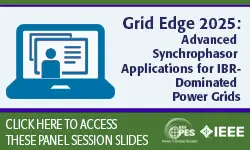ISGT Europe 2022 panel session 5: Powering System flexibility in the Future through Renewable, H2020 POSYTYF project (Slides)
B. Marinescu, H. Schulte, V. Lacerda, A. Ortega Manjavacas
-
Members: FreePES
IEEE Members: $25.00
Non-members: $40.00Pages/Slides: 73
Panel
10 Oct 2022
In the H2020 POSYTYF project a new concept of Dynamic Virtual Power Plant (DVPP) is introduced to fully integrate the dynamic aspects at all levels: locally (for each RES generator), globally (for grid ancillary services and interaction with other neighbor elements of the grid) and economically (for internal optimal dispatch and participation to electricity markets). This concept is presented along with the global control architecture on which it relays. 3 topics of the approach are next detailed:
- Simulation: suitability of EMT and phasor models to simulate large grids with renewable generation and power-electronics-interfaced storage is discussed. The objective is to provide criteria to state which simulation method should be used in each given power system situation and the implications and drawbacks of each one.
- Reduced physical models of Renewable energy-based power plants for DVPP control design: interpretable dynamic models of Renewable energy-based power plants for the controller design of DVPPs are proposed in a unified mathematical form of matrices of transfer functions. Different renewable energy sources (wind, sun, biogas), electrical connection to the grid (synchronous machine -, inverter-based) and support levels for the grid (following, forming) are considered. Thereby, both the power tracking behavior and disturbance behavior of the individual power plants of the DVPP are described.
- Optimization for simultaneous participation of the DVPP in Energy and Reserve Markets in Europe: A robust optimal bidding which takes into account the uncertainties that characterize non-dispatchable renewable energy sources, the willingness and availability of demand response, the market prices, and the features of the synchronous, dispatchable renewable energy sources.
- Simulation: suitability of EMT and phasor models to simulate large grids with renewable generation and power-electronics-interfaced storage is discussed. The objective is to provide criteria to state which simulation method should be used in each given power system situation and the implications and drawbacks of each one.
- Reduced physical models of Renewable energy-based power plants for DVPP control design: interpretable dynamic models of Renewable energy-based power plants for the controller design of DVPPs are proposed in a unified mathematical form of matrices of transfer functions. Different renewable energy sources (wind, sun, biogas), electrical connection to the grid (synchronous machine -, inverter-based) and support levels for the grid (following, forming) are considered. Thereby, both the power tracking behavior and disturbance behavior of the individual power plants of the DVPP are described.
- Optimization for simultaneous participation of the DVPP in Energy and Reserve Markets in Europe: A robust optimal bidding which takes into account the uncertainties that characterize non-dispatchable renewable energy sources, the willingness and availability of demand response, the market prices, and the features of the synchronous, dispatchable renewable energy sources.
Chairs:
Dr. Bogdan Marinescu



